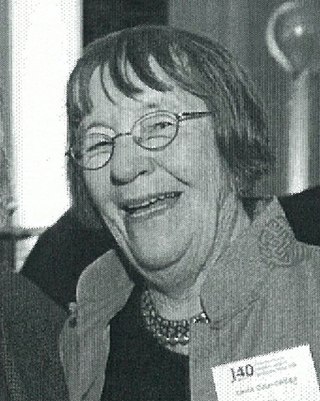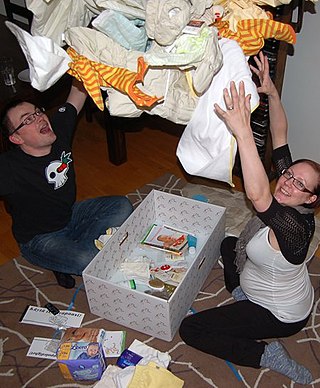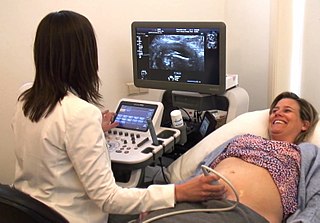
Frank Sargeson was a New Zealand short story writer and novelist. Born in Hamilton, Sargeson had a middle-class and puritanical upbringing, and initially worked as a lawyer. After travelling to the United Kingdom for two years and working as a clerk on his return, he was convicted of indecent assault for a homosexual encounter and moved to live on his uncle's farm for a period. Having already written and published some short stories in the late 1920s, he began to focus on his writing and moved into his parents' holiday cottage where he would live for the rest of his life.
The National Childbirth Trust (NCT) is the UK's largest charity offering information and support in pregnancy, childbirth and early parenthood Since 1956 it has supported millions of parents through birth of their children and through early parenthood while bringing about advances in professional practice and public policy. The charity's mission is to support parents through the first 1,000 days: from the beginning of pregnancy through to the child's second birthday.

Water birth is childbirth that occurs in water, usually a birthing pool. It may include the use of water for relaxation and pain relief during the first stage of labour, birth into water in the second stage of labour, and the delivery of the placenta in the third stage of labour.
Playcentre is an early childhood education and parenting organisation which operates cooperative parent-led early childhood education centres throughout New Zealand. While the concept originated in New Zealand, it is now also established in Japan.

Tsan Yuk Hospital is maternity hospital is located on 30 Hospital Road, Sai Ying Pun on Hong Kong Island, is a public hospital in Hong Kong, It was specialising in obstetrics and gynaecology. It also operates as a teaching and training hospital for the medical and nursing students of Li Ka Shing Faculty of Medicine of the University of Hong Kong.

Queen Charlotte's and Chelsea Hospital is one of the oldest maternity hospitals in Europe, founded in 1739 in London. Until October 2000, it occupied a site at 339–351 Goldhawk Road, Hammersmith, but is now located between East Acton and White City, adjacent to the Hammersmith Hospital. It is managed by the Imperial College Healthcare NHS Trust.
A baby bonus is a government payment to parents of a newborn baby or adopted child to assist with the costs of childrearing.

Prunella Mary Briance (1926–2017) was the British founder of the National Childbirth Trust and a passionate campaigner to improve the health of women and their experience in childbirth.

Dame Christine McKelvie Cole Catley was a New Zealand journalist, publisher and author. She co-founded the Parents Centre movement and influenced broadcasting policy in New Zealand.

Holly Ruth Walker is a New Zealand writer, public servant, and former politician.

The maternity package, known internationally as the Finnish "baby box," is a kit granted by the Finnish social security institution Kela, to all expectant or adoptive parents who live in Finland or are covered by the Finnish social security system. The package contains children's clothes and other necessary items, such as nappies, bedding, cloth, gauze towels and child-care products. It was first issued in 1938 to parents with a low income, and contained a blanket, crib sheets, diapers, and fabric which parents could use to make clothing for the baby.
Infanticide in 19th-century New Zealand was difficult to assess, especially for newborn indigenous Māori infants. Resultantly, many New Zealand women who might otherwise have been sentenced to penal servitude or capital punishment had their sentences commuted to the lesser charge of "concealment of birth" under the Offences Against the Person Act 1867. However, the relative leniency extended only to mothers of concealed or hidden infants who subsequently died. Fathers, grandparents and "baby farmers" like Minnie Dean, the only woman to be executed in New Zealand history, and Daniel Cooper in the 1920s were viewed as more culpable for the death of such infants.

A midwife is a health professional who cares for mothers and newborns around childbirth, a specialization known as midwifery.
Charles Maurice Bevan-Brown was a New Zealand psychiatrist and psychotherapist who practised in Christchurch from the 1940s to the 1960s. He established a clinic for medical psychology and founded the New Zealand Association of Psychotherapists. He was influential in the formation and ethos of Parents' Centres New Zealand.
Oranga Tamariki (OT), also known as the Ministry for Children and previously the Ministry for Vulnerable Children, is a government department in New Zealand responsible for the well-being of children, specifically children at risk of harm, youth offenders and children of the State. It is the successor agency of the former department, Child, Youth and Family (CYF).

Helen May is a New Zealand education pioneer. She has been an eloquent activist and academic in education, with a strong feminist focus on early childhood education. Her advocacy has been characterised by its focus on the rights and needs of children and teachers, expressed by an active and collaborative engagement with educational institutions, trade unions, the Ministry of Education and other government agencies.
Marie Bell was a New Zealand educationalist, lecturer and teacher who had a career lasting almost three-quarters of a century. Her career was governed by a child-friendly and progressive outlook that she was exposed to at Wellington Teachers' College. Bell was a supervisor and teacher who introduced a child-led education philosophy to allow children to learn in their own development and interests into New Zealand schools. She also worked for various associations, committees, conferences, commissions and educational boards to further early childhood learning.

The St Helens Hospitals were maternity hospitals located in seven New Zealand cities. They were the first state-run maternity hospitals in the world offering both midwifery services and midwifery training. The first hospital opened in 1905 in Wellington and the last one in Wanganui in 1921. The services of the St Helens Hospitals were gradually incorporated into other hospitals and the last hospital to close was in Auckland in 1990.
Helen Jean Brew was a New Zealand actor, birth campaigner, documentary filmmaker, educator and speech therapist for children. She developed a belief that most of Western society's dysfunction to its approach to childbirth created stress and suffering for women in childbirth and in 1952 co-established the Natural Childbirth Group that later became Parents Centres New Zealand. Brew taught pregnant women informal antenatal classes and she travelled to China, Israel, Europe and Tibet during her career. She made film documentaries such as Birth with R.D. Laing and had a role in the soap opera Close to Home in 1975.
Eunice Mary Eichler was a New Zealand Salvation Army officer, nurse and midwife. She established New Zealand's first school for pregnant teenagers in 1973, and was an advocate for open adoption.











